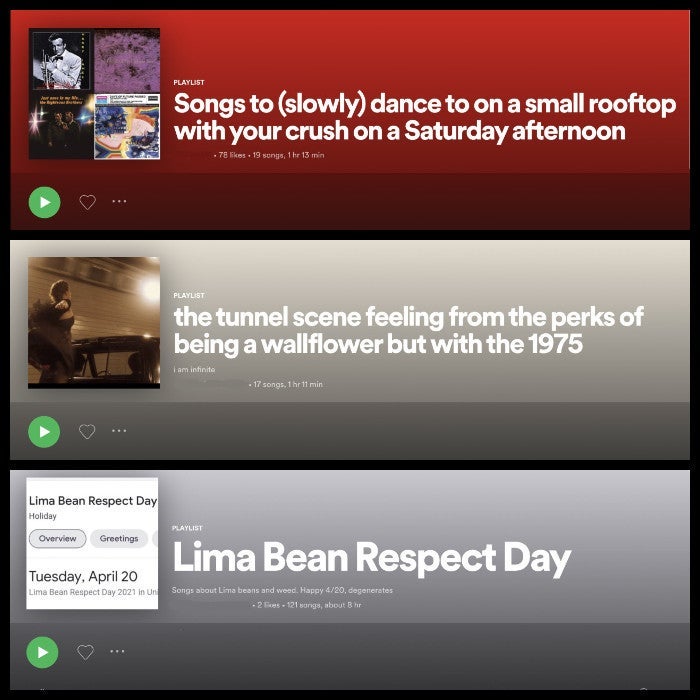Creating a playlist is an art. Similar to the classic cassette mixtape and burned mix CD, an online playlist is never as simple as a collection of a few tracks that you like thrown together. A playlist is an attempt to capture a mood, a vibe; it is a personally curated soundtrack to a broken heart or a new love or a workout or a teenage tantrum.
However, some people aren’t content with centering their playlists around something so trite as a broken heart. In the private, increasingly popular Facebook group “oddly specific playlists,” almost 25,000 people have come together to lovingly craft playlists that pinpoint even more highly specific vibes, feelings or themes. Joining the group is easy—where other Facebook groups gatekeep and enforce rules for entry, you simply need to request to be let in. The only admin rules are simple: Be nice and respectful, no promotion or spam, no reporting posts or comments, and be as specific as possible with your playlists. Admins are vigilant in enforcing these few rules, but the group doesn’t feel exclusionary.
“Oddly specific playlists” has refined the art of the playlist from the vague (like generic themes of “’90s R&B,” “workout bangers,” or “’00s hits”) to microscopic precision. The group’s users post their own uniquely defined playlists to listen to and share, and they also make requests for other members to help contribute to a very particular mood: “it’s been a while since you’ve taken a shower and you’re finally gonna take one and dance around and maybe slip and crack your head open type songs;” “songs i listen to when the gang of 15 year olds at the train station are intimidating me;” “eating painkillers at mcdonald’s;” and “I took this photo in 2014 but now the stories of that time are completely gone” are among the recent themes members have sought contributions to. Users often caveat their posts with “maybe this is just me,” but no matter how, well, oddly specific the request is (another good one: “looking for songs that make you feel like a misunderstood villain who is just struggling with past trauma”), there are always people who relate and are willing to suggest a fitting track to include.
Part of the Facebook group’s charm is that it feels like an anomaly on the internet in 2021. At a time when social media can feel like a very loud, dark room full of conspiracy theorists and people angry about the news, the niche corners of the internet that some outliers have carved out feel like a peaceful respite. In the group, people don’t tend to fight or disagree about which songs are appropriate for which playlists. The things that can make people fall out online, like politics, are largely absent. So too is the toxicity of many music fandoms online. On Twitter, fans compete for the attention of their faves to often dangerous degrees, threatening detractors and critics. Elsewhere, fans self-consciously gatekeep what it means to be a fan of a certain genre, particularly in alternative music. But among “oddly specific playlists” users, all that matters are good playlists and good vibes.

“For me, the beauty of the group comes from one simple premise: getting recommendations from others without the overly-critical and toxic nature found in many other music groups on Facebook,” says Eli, 25, an admin of the group. “No one is going to get laughed at, whether you’re a Belieber or a devout thrash metal head.” Eli and his fellow admins work hard to chuck out any trolls that try to disrupt the good vibe of the group: “Facebook is massively prone to toxic behavior, and I think our success is down to making sure it doesn’t occur in the comments sections.”
That openness to different music tastes makes the group an ideal place for people to discover new music, shame-free. “Being able to find gems among all the recommendations, and feeling like my often weird tastes are shared by others, has been the most enjoyable part of the group,” says Eli. Whether it’s meeting other people into Japanese city pop or finding Lou Reed tracks they’ve never heard before, someone else is always able to introduce users to something new. “A number of times, we’ve had new members post playlists with the general caveat of ‘please don’t judge me’ attached to their post,” says Eli. “Reassuring them that no one is going to be doing that often comes as a pleasant surprise and it’s very satisfying to let people know that they’ll be respected regardless of their tastes.”.
Chris, 30, is an active member of the Facebook group and speaks highly of it. “The reason I like this group a lot is because I’m constantly discovering new music and there’s only so much ear time in the day, so I might neglect some old bangers,” he says, and he enjoys the game of taking part: “I recently saw one like, ‘best albums that start and end with a banger,’ and I really liked that, because it’s like a nice brain teaser for me to think of. Essentially, it’s like doing a fun Sudoku, and I get to listen to a song I like as a reward!” Like other members, Chris likes the wholesome atmosphere of the group as well. “Music lovers tend to be snobs and there’s never any down-slamming of people’s tastes,” he says.
While many of the playlists and requests for recommendations are funny in their pinpoint specificity, many more speak to the poster’s emotional state of being. People wrestling with heartbreak, trauma, nihilism, low self-esteem, and other personal issues find not just song recommendations but also people who empathize with their struggle. Ilke, 18, tells me that they find making playlists “therapeutic”: “Even if it’s something that you’d never think anyone could relate to, no matter how specific, someone can always bond with you through music,” they add.
All of the admins I spoke to say that they have seen the group’s membership grow over the past year—not just a natural incline, but one that they believe is a result of the coronavirus pandemic. As increased loneliness and stress have contributed to declining mental health, people have turned to online communities to seek reassurance and companionship. “I guess loneliness is, more than ever in recent memory, a common experience for many,” says Eli.“This has driven perhaps more extroverted people online to find social interaction, and the chance to find like-minded people worldwide has, and speaking from a personal perspective, really helped me through some dark times.” While he doesn’t believe that everyone in the group is looking for this kind of deep connection, even the posts that are only intended to “get a giggle” out of their audience still inspire and drive the community.
As much of social media gets more hostile, people will continue to be pushed to these ever-diminishing safe corners on the fringes of the internet. Those spaces are where we can feel joy in our fandoms again. Whether it’s “songs either questioning the existence of god in the midst of human suffering, or flat out saying he doesn’t exist?” or “that one scene from fleabag,” “oddly specific playlists” allows its members to crowd around a shared, community-led experience. And they’ll find some really great new songs to listen to, while they’re at it.
In my decade at Slate, I’ve worked on everything from investigating how wearing your backpack with two straps became cooler than wearing it with one strap to adapting The Great Gatsby as a video game to inventing a highly scientific systemic for determining whether new movies are too scary for you. The support of Slate Plus members has allowed us to continue to do the kind of ambitious, irreverent, and service-y cultural coverage you won’t find anywhere else. Thank you! —Forrest Wickman, culture editor
